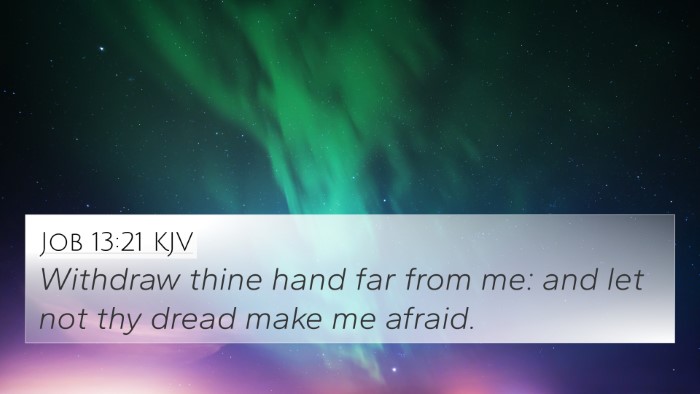Old Testament
Genesis Exodus Leviticus Numbers Deuteronomy Joshua Judges Ruth 1 Samuel 2 Samuel 1 Kings 2 Kings 1 Chronicles 2 Chronicles Ezra Nehemiah Esther Job Psalms Proverbs Ecclesiastes Song of Solomon Isaiah Jeremiah Lamentations Ezekiel Daniel Hosea Joel Amos Obadiah Jonah Micah Nahum Habakkuk Zephaniah Haggai Zechariah MalachiJob 22:10 Similar Verses
Job 22:10 Cross References
Therefore snares are round about thee, and sudden fear troubleth thee;
Uncover the Rich Themes and Topics of This Bible Verse
Listed below are the Bible themes associated with Job 22:10. We invite you to explore each theme to gain deeper insights into the Scriptures.
Job 22:10 Cross Reference Verses
This section features a detailed cross-reference designed to enrich your understanding of the Scriptures. Below, you will find carefully selected verses that echo the themes and teachings related to Job 22:10 KJV. Click on any image to explore detailed analyses of related Bible verses and uncover deeper theological insights.

Job 6:4 (KJV) »
For the arrows of the Almighty are within me, the poison whereof drinketh up my spirit: the terrors of God do set themselves in array against me.

Psalms 11:6 (KJV) »
Upon the wicked he shall rain snares, fire and brimstone, and an horrible tempest: this shall be the portion of their cup.

Proverbs 1:27 (KJV) »
When your fear cometh as desolation, and your destruction cometh as a whirlwind; when distress and anguish cometh upon you.

1 Thessalonians 5:3 (KJV) »
For when they shall say, Peace and safety; then sudden destruction cometh upon them, as travail upon a woman with child; and they shall not escape.

Proverbs 3:25 (KJV) »
Be not afraid of sudden fear, neither of the desolation of the wicked, when it cometh.
Job 22:10 Verse Analysis and Similar Verses
Understanding Job 22:10
Job 22:10 states: "Therefore snares are round about thee, and sudden fear troubleth thee." This verse is part of a dialogue in which Eliphaz, one of Job's friends, is responding to Job's plight. Eliphaz's words imply that Job's suffering is a result of his wrongdoing, a common theme throughout the book of Job.
Verse Meaning and Interpretation
The interpretation of Job 22:10 can be understood through the lens of several public domain commentaries, which provide deeper insights into its implications.
Insights from Matthew Henry
Matthew Henry notes that this verse illustrates the idea that calamity surrounds those who are guilty of sin. Eliphaz accuses Job of being ensnared by his own transgressions, suggesting that misfortunes are a divine response to a person’s moral failures.
- Divine Retribution: Henry emphasizes that Eliphaz reflects the belief in divine retribution—a common theological viewpoint that suffering is a direct result of sin.
- Human Perspective: However, Henry points out that this perspective does not account for the complexities of divine justice and human suffering, highlighting that Job's case is notably unique.
Insights from Albert Barnes
Albert Barnes further interprets this verse as a confirmation of the perception among the friends that Job's trials are a manifestation of his guilt. Barnes asserts that Job’s situation is used to demonstrate a common belief of the time: that the righteous are rewarded and the wicked are punished visibly.
- Fear and Anxiety: Barnes discusses the "sudden fear" that plagues Job, suggesting that those who live with sin face internal turmoil as a consequence of their guilt.
- Encouragement for Repentance: The imagery of snares serves to urge Job—and readers—to reflect on personal conduct and seek reconciliation with God.
Insights from Adam Clarke
Adam Clarke interprets Job 22:10 by aligning it with the broader theme of the book regarding the nature of sufferings and the responses to them among friends and community. Clarke notes that the "snares" reference the entrapments that come as a result of one’s actions.
- Moral Reflection: Clarke encourages readers to engage in moral self-reflection, suggesting that adversity may serve as a sobering reminder of one’s spiritual standing before God.
- Call to Understanding: He emphasizes the importance of seeking deeper understanding rather than hastily assigning guilt or offering simplistic explanations for suffering.
Related Bible Cross References
Job 22:10 relates to several other scriptures that illustrate the themes of divine justice, suffering, and moral conduct. The following verses can be cross-referenced for a more comprehensive understanding of the topic:
- Psalm 25:10: "All the paths of the Lord are mercy and truth unto such as keep his covenant and his testimonies." - This ties into the theme of retribution for morality.
- Proverbs 11:21: "Though hand join in hand, the wicked shall not be unpunished: but the seed of the righteous shall be delivered." - Establishes the principle of justice in relation to the righteous vs. the wicked.
- Galatians 6:7: "Be not deceived; God is not mocked: for whatsoever a man soweth, that shall he also reap." - Reflects the biblical law of sowing and reaping in both spiritual and earthly matters.
- Ezekiel 18:30: "Therefore I will judge you, O house of Israel, every one according to his ways, saith the Lord God. Repent, and turn yourselves from all your offenses; so sin will not be your downfall." - A call for repentance which correlates with Job’s situation.
- James 4:10: "Humble yourselves in the sight of the Lord, and he shall lift you up." - Relates to the theme of humility amidst suffering.
- 2 Corinthians 5:10: "For we must all appear before the judgment seat of Christ; that every one may receive the things done in his body, according to that he hath done, whether it be good or bad." - Emphasizes accountability for actions.
- Romans 2:6: "Who will render to every man according to his deeds." - A fundamental concept regarding God’s justice system that parallels with Job 22:10.
Conclusion
In summary, Job 22:10 serves as a potent reminder of the complexities of suffering and the perceptions of sin within biblical texts. The dialogues in the Book of Job reveal crucial insights into human understanding of divine justice and the moral imperative to seek God's face amid adversities. Through cross-referencing and linking related scriptures, we gain a fuller understanding of the themes present in Job’s narrative, encouraging deeper reflection on the nature of our own lives in relation to God’s righteousness.





